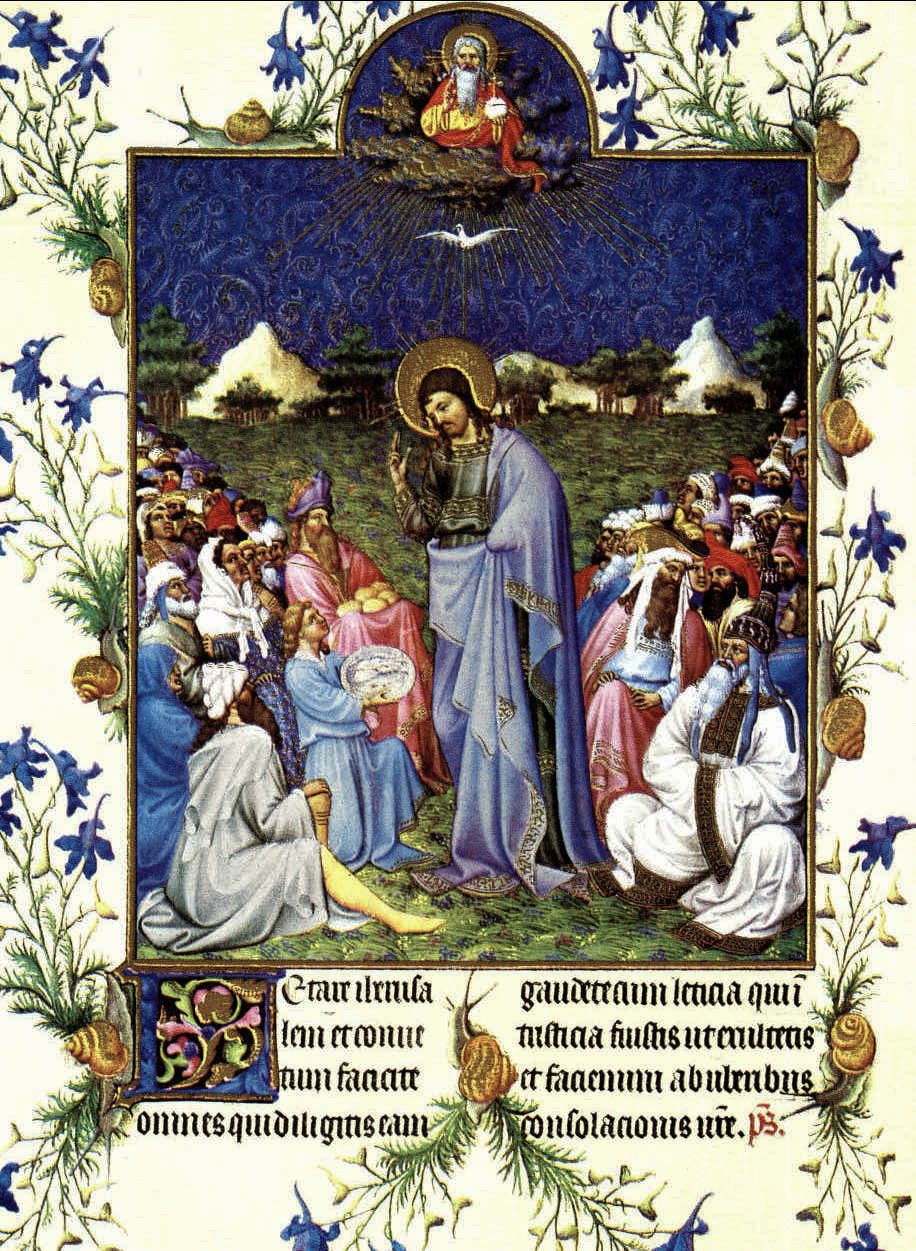(Laetare Sunday)

Posted on 03/01/2008 7:52:35 PM PST by Salvation

|
And from the Mass:
And after the miracle of the loaves and fishes, this is what happens, according to John's Gospel:
"Gather up the fragments lest they be lost," He said to them. And the Twelve did, symbolizing their future ordinations, their being given to power to feed His sheep with His Body and Blood as foreshadowed in the miracle of the loaves and fishes.
|
Rejoice!
 The fourth Sunday in Lent (Mid-Lent) derives its Latin name from the first word of the Mass text, "Laetare Jerusalem" (Rejoice, O Jerusalem). It is a day of joy within the mourning season. The altars may be decorated with flowers, organ playing is permitted, and the priests may wear rose-colored vestments instead of purple. The reason for such display of joy is explained in a sermon by Pope Innocent III (1216): The fourth Sunday in Lent (Mid-Lent) derives its Latin name from the first word of the Mass text, "Laetare Jerusalem" (Rejoice, O Jerusalem). It is a day of joy within the mourning season. The altars may be decorated with flowers, organ playing is permitted, and the priests may wear rose-colored vestments instead of purple. The reason for such display of joy is explained in a sermon by Pope Innocent III (1216): "On this Sunday, which marks the middle of Lent, a measure of consoling relaxation is provided, so that the faithful may not break down under the severe strain of Lenten fast but may continue to bear the restrictions with a refreshed and easier heart."[31] As a symbol of this joy the popes used to carry a golden rose in their right hand when returning from the celebration of Mass. Pope Leo IX (1051) calls this custom an "ancient institution." Originally it was a single rose of natural size, but since the fifteenth century it has consisted of a cluster or branch of roses wrought of pure gold and set with precious stones in brilliant workmanship by famous artists. The popes bless it every year, and |
often they confer it upon churches, shrines, cities, or distinguished persons as a token of esteem and paternal affection. In case of such a bestowal, a new rose is made during the subsequent year. The meaning and symbolism of the golden rose is expressed in the prayer of blessing. It represents Christ in the shining splendor of His majesty, the "flower sprung from the root of Jesse." From this ecclesiastical custom Laetare Sunday acquired its German name, Rosensonntag (Sunday of the Rose). In this country Laetare Sunday receives much publicity in the papers because of Notre Dame's bestowal each year (since 1883) of the Laetare Medal on an American lay Catholic distinguished in literature, art, science, philanthropy, sociology, or other field of achievement. It is an adaptation of the papal custom of the golden rose, and the medal is made of heavy gold and black enamel tracings bearing the inscription "Magna est veritas et praevalebit" (Truth is mighty and shall prevail). It is suspended from a bar on which is lettered "Laetare Medal."
|
In England a charming tradition developed toward the end of the Middle Ages. On Laetare or Mid-Lent Sunday, boys and girls who lived away from home (as apprentices, servants, etc.) were given permission to go home to visit their mother church, in which they were baptized or had been brought up. They always carried with them gifts to put on the altar. The original reason for this was because the first words of the Mass, "Laetare Jerusalem," were considered in medieval times to be addressed to the "second Jerusalem" (the Church). And as the Jews called Jerusalem "Mother Jerusalem," so the Christians later called the church which gave them spiritual birth in baptism, "Mother Church." It was also the custom for the boys and girls to visit their own mother on the same day. They brought her flowers and simnel cakes (a rich plum cake; from simila, fine flour) and would do all the housework for her. This old custom still survives in certain parts of England, and the cakes are sold in London as well as provincial towns. Hence the name "Mothering Sunday" and the famous old saying, "He who goes a-mothering finds violets in the lane." An ancient carol entitled "Mothering Sunday" (It Is the Day of All the Year) may be found in the "Oxford Book of Carols." The tune is taken from an old German song of the fourteenth century. Robert Herrick (1674) mentioned the custom in his poem To Dianeme: I'll to thee a simnel bring Our own Mother's Day, first celebrated in May 1914, does not have either the same origin or historical background, but the central idea of bestowing special favors and little gifts on our mothers in appreciation and love is similar. In many churches sermons are devoted on that day to the greatest mother of all, the Blessed Mother, Mary. |
|
Lætare Sunday
Rejoice, O Jerusalem...
The Fourth Sunday of Lent is called Lætare (Rejoice) Sunday, from the first words of the liturgy [Introit] above. Since it is in the middle of Lent, like Gaudete Sunday midway through Advent, Lætare reminds us of the Event we look forward to at the end of the penitential season. As on Gaudete Sunday, rose-colored vestments may replace violet, symbolizing, the Church's joy in anticipation of the Resurrection.
In England, this Sunday is known as Mothering Sunday, a custom that arose during the Middle Ages, because the Epistle for the day said, "But Jerusalem which is above, is free, which is the mother of us all" [Galatians 4:26]. The Church is "Jerusalem which is above."
On Lætare Sunday people went to Church where they were baptized (their mother church); and visited their own mothers, as well, often bringing gifts of flowers and simnel cakes (so-called because they were made with fine white flour, or simila.) There are many different recipes for this cake, but all are fruit-cakes covered with almond paste. Mothering Sunday reminds us of the American Mother's Day, although the latter is a holiday honoring mothers which was originated in the early twentieth-century, and though similar, it is unrelated to the Lenten tradition of Mothering Sunday.
Even if we don't celebrate this day as Mothering Sunday (or maybe just don't like fruitcake!) it would be appropriate, on the "Rejoice" Sunday, to have a special treat for the Sunday meal in honor of our Mother, the Church.
Please notify me via FReepmail if you would like to be added to or taken off the Catholic Discussion Ping List.
WDTPRS - translation point regarding the optional rite of washing feet & Laetare Sunday
Most lovely reading for Rose Sunday.
I liked the recipe for that cake. But most people would not like the fruity stuff.
Quite a mixture of flavors and spices in that simnel cake, almost like a Christmas fruit cake. Sounds yummy.
Oh, good! Father will be in his shrieking pink vestments today :-).
Freep-mail me to get on or off my pro-life and Catholic List:
Please ping me to note-worthy Pro-Life or Catholic threads, or other threads of interest.
Our priest prefers to call it “rose”!!!!
Yes, Father Hawker calls it “rose,” too, but it’s shrieking pink. The vestments were a gift from his former parish (20 years ago) up in Massachusetts, and they are LOUD.
Faith sharing bump.
And back atcha! I hope you’re having a productive Lent!
Papal
Laetare (Rejoice) Sunday is the day that — since we have passed the halfway point of Lent — the Church looks forward to the joy of Easter. It’s called “Rose Sunday” for two reasons. First, priests may wear rose-colored (practically pink) vestments today. Second, it’s the day of the “blessing of the golden rose” in St. Peter’s, a ceremony that was already called an “ancient ceremony” in 1051. The intricately fashioned solid gold roses were once sent to Catholic monarchs. Now they are bestowed on shrines.
A rose comes from a thorny stem yet has beauty and a sweet smell. This is a symbol of the way Christians’ faith blossoms in Lent from sacrifice.
Pope John Paul II awarded four golden roses; Pope Benedict XVI has awarded seven.
Pope Benedict XVI has given roses to shrines in countries he has visited. For instance, in 2008, the year of his U.S. visit, he bestowed the golden rose on the Basilica of the National Shrine of the Immaculate Conception in Washington, D.C.
Rejoice!
Disclaimer: Opinions posted on Free Republic are those of the individual posters and do not necessarily represent the opinion of Free Republic or its management. All materials posted herein are protected by copyright law and the exemption for fair use of copyrighted works.